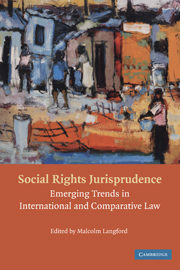Book contents
- Frontmatter
- Contents
- Foreword – Philip Alston
- Preface
- PART ONE OVERVIEW
- PART TWO SELECT NATIONAL JURISDICTIONS
- 4 South Africa
- 5 India
- 6 South Asia
- 7 Colombia
- 8 Argentina
- 9 Brazil
- 10 Venezuela
- 11 Canada
- 12 The United States
- 13 Hungary
- 14 France
- 15 United Kingdom
- 16 Ireland
- PART THREE REGIONAL PROCEDURES AND JURISPRUDENCE
- PART FOUR INTERNATIONAL HUMAN RIGHTS PROCEDURES AND JURISPRUDENCE
- PART FIVE SPECIAL TOPICS
- Notes on Contributors
- Table of Authorities
- Index
- References
13 - Hungary
Social Rights or Market Redivivus?
Published online by Cambridge University Press: 05 June 2012
- Frontmatter
- Contents
- Foreword – Philip Alston
- Preface
- PART ONE OVERVIEW
- PART TWO SELECT NATIONAL JURISDICTIONS
- 4 South Africa
- 5 India
- 6 South Asia
- 7 Colombia
- 8 Argentina
- 9 Brazil
- 10 Venezuela
- 11 Canada
- 12 The United States
- 13 Hungary
- 14 France
- 15 United Kingdom
- 16 Ireland
- PART THREE REGIONAL PROCEDURES AND JURISPRUDENCE
- PART FOUR INTERNATIONAL HUMAN RIGHTS PROCEDURES AND JURISPRUDENCE
- PART FIVE SPECIAL TOPICS
- Notes on Contributors
- Table of Authorities
- Index
- References
Summary
INTRODUCTION
The fall of the Berlin Wall and the concurrent demise of many communist governments ushered in a period of frenzied constitution-making in Eastern Europe and, for the first time, the opportunity for the constitutional judicial review of human rights. While the Eastern European constitutions of the communist period had included social rights, they were rarely subject to judicial scrutiny.
The extent to which these new constitutions recognise social rights varies between the States that were formally under the influence or direct rule of the Soviet Union. As Sadurski notes, of twenty post-communist states in Eastern and Central Europe, eleven have fully-fledged catalogues of economic, social and cultural rights with the remainder recognising a more limited number of rights, and two possessing virtually none at all. Equally, the degree of justiciability varies, with fourteen constitutions making no distinction between the enforceability of civil and political rights and economic, social and cultural rights.
The case of Hungary represents perhaps a midway course. The Hungarian Constitution provides recognition of a number of social rights and over the past decade the Constitutional Court has attempted to develop a systematic approach to their interpretation, although not without controversy. The Court has been seen as caught between encouraging the post-communist impulse of providing the legal foundations for a market economy and paying heed to a relatively strong public consensus for continuing some version of the communist welfare state.
- Type
- Chapter
- Information
- Social Rights JurisprudenceEmerging Trends in International and Comparative Law, pp. 250 - 266Publisher: Cambridge University PressPrint publication year: 2009
References
- 1
- Cited by



